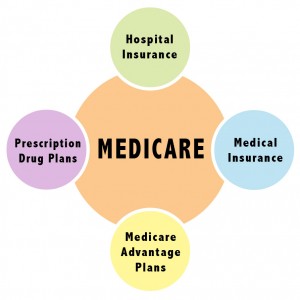What is Medicare? Here is the Medicare Definition:
Medicare is a health insurance program from the federal government that covers most people that are of the age of 65 or older. If you’re younger than 65, Medicare will cover your health care costs if you’re disabled or have End Stage Renal Disease. People covered by Medicare are called the beneficiaries of the medical insurance program. Medicare will pay for most of the health care they are in need of, but not all of it. Read more about the history of American Medicare here.
Medicare will cover the majority of acute medical conditions that the patient will naturally recover from. It will not cover health care given in the beneficiaries’ home, in assisted living facilities, or any nursing homes, even if the person has a long term or chronic illness or disability. There are also long gaps of Medicare’s prescription drug plan that can complicate medical needs.
There are 4 types of Medicare benefits a person can receive, parts A, B, C and D.
 Medicare Part A is for inpatient hospital care, hospice, some skilled nursing facilities, and some health care in other facilities.
Medicare Part A is for inpatient hospital care, hospice, some skilled nursing facilities, and some health care in other facilities.
Medicare Part B is normally covered by a monthly premium to help pay for the cost of doctors, outpatient hospital care, and physical and occupational therapy that one might need.
Medicare Part C supplements the top, but allows the beneficiaries to go to other health care organizations that normally only take HMPs, PPOs, and private health insurances.
Medicare Part D of Medicare provides prescription drug benefits through private insurance companies.
Medicare can run smoothly the majority of the time, but it also can be rocky as well. This is because Medicare does not cover the total amount of coverage’s, and the beneficiary ends up paying a large sum over the amount of time that they have the coverage.
Need help? Call today to receive a free quote! (714) 729-3161




